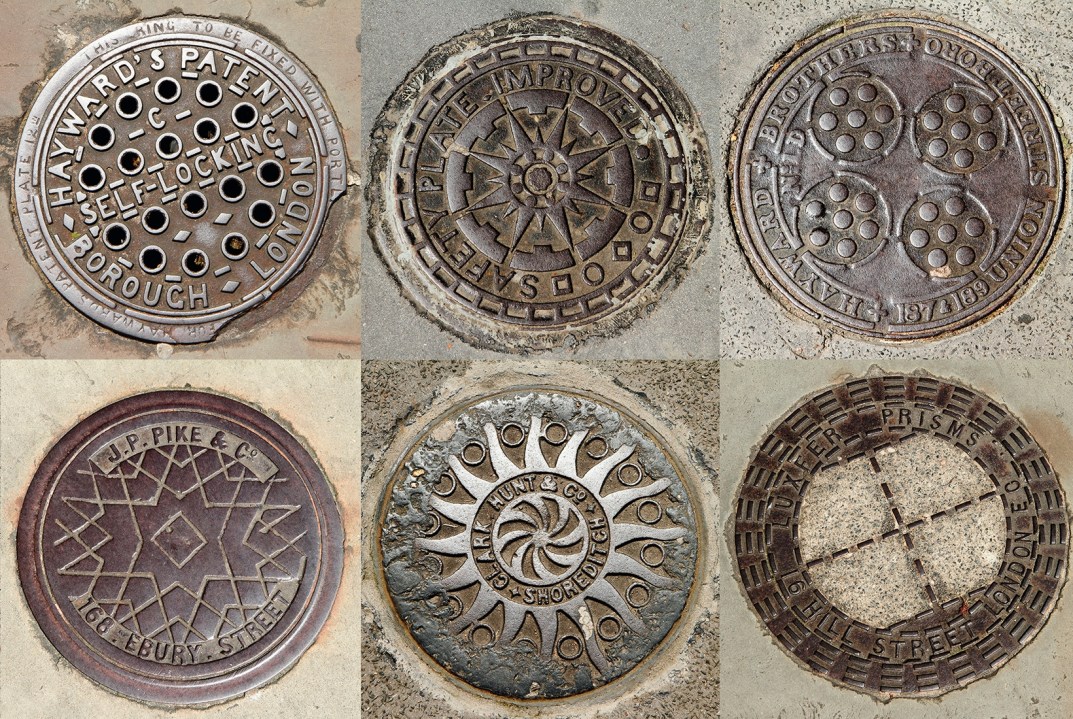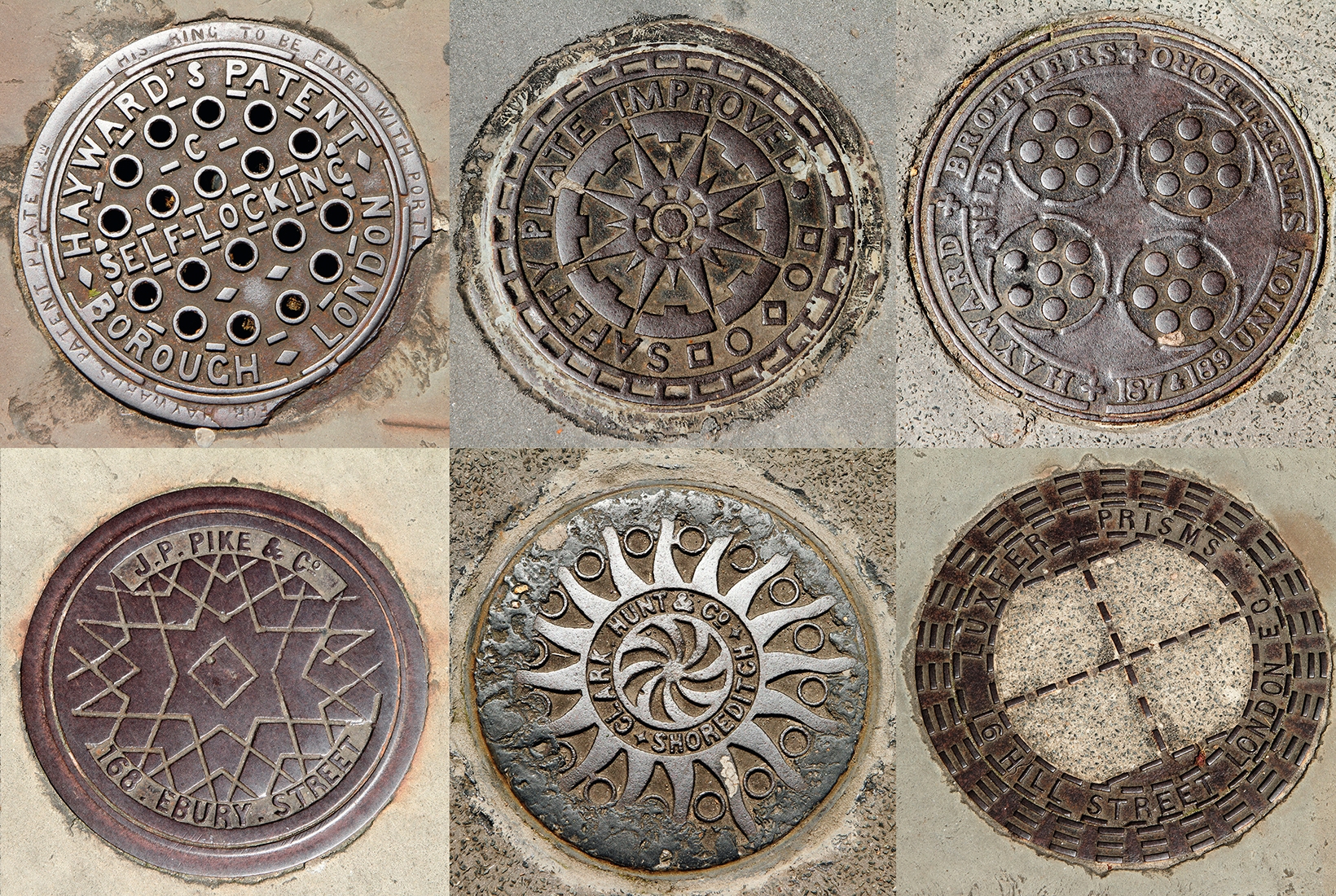It was possible to stand in the middle of the road during the lockdown without being run over. In Willow Place, near Victoria Station, I crouched over a narrow grating of stout grey iron, and caught a glimpse of light reflected from moving water deep below, as though at the bottom of a well. This was the River Tyburn, on its way from Hampstead via Buckingham Palace to the Thames.
During the endlessly sunny lockdown days, I wandered the streets near my office in Victoria. The bright unpeopled silence (like a landscape by de Chirico) brought to my attention details unnoticed before. With all the galleries closed, this was street art.
Hidden rivers are romantic, and commuters are often astonished to learn that the fat green-painted iron pipe above their heads, crossing the tracks of the District Line, is the River Westbourne. But the interest for me in that grating in Willow Place (beneath which is more of a sewer than a river) is the ironwork from which it is made.
Iron provides beautiful and durable furniture for the street. ‘Look up!’ said John Betjeman in a good piece of advice to lovers of architecture, but for the past few years I have also been looking down, particularly at coal plates. These are the cast-iron covers for coal holes that for 170 years or so have been set into the pavement above cellars. Like the ironwork of drain-gratings these are not rusty affairs.
Coal plates have their beauty, though the geometric patterns (with the names of the makers or ironmongers in relief) were incised, not for the sake of art, but to stop pedestrians slipping on them. A medical student called Shephard Taylor sketched 150 patterns in 1863 (published in a booklet called Opercula), and some are still to be seen today. They are preserved by neglect. Few notice them. But they are in constant danger from redevelopment and repaving.
You can’t beat the white painted iron bollards near Sloane Street with raised lettering in black
Ironwork set into pavements looks very different according to the paving. London was largely paved with York stone. Now, edged with fat granite kerbs, urban pavements are clothed in concrete slabs, often cracked by vehicles driving over them. At least where coal plates survive, the stone slab in which each is set gives a clue to what the whole pavement once looked like.
Painted ironwork, usually black, suits stucco, brick or stone walls like buttons and seams on clothing. Area railings give a trim at ground level, balcony railings at the first floor. Beside doorways, in niches like little kennels, live boot-scrapers. By 18th-century houses in St James’s conical extinguishers remain from the days when link-boys lit the way home for the grander sort, before public gaslights.
Boot-scrapers warded off horse dung. Links warded off dangerous darkness. In some corners spiked ironwork survives that once deterred men from peeing there. The strategy was to prevent close approach and make someone else’s corner seem more attractive. Such an anti-pee device fences off a corner in front of the Reform Club in Pall Mall (1841); there’s even one at the corner of Westminster Cathedral (1903).
Obsolete street furniture has the accidental attraction of age and curiousness. Gas lamps seem all the more beautiful because present-day lamp-posts are so undistinguished. For us today the kindly light from an old lamp-post contributes to the idea of urban night. For Ruskin, though, gas lighting when it was installed in Venice was hateful.
In London, of the hundreds of gas lamps still in use (with electric timers), the most obvious are around the Palace of Westminster and in the Mall. Their softer light is appreciated by the Prince of Wales in a similar way to the unmown border of meadow grass and flowers he has encouraged in the Mall.
It is possible to be too Mary Poppins and roast beef about London’s street furniture. Take bollards. I like a good bollard, and they had great functional value in the days of heavy iron-rimmed wagon wheels threatening brick corners. But very few remain that were once captured cannon, as people claim. You can’t, I think, beat the white painted iron bollards near Sloane Street with raised lettering in black declaring: ‘Hans Town 1819’. The speculative 18th-century development of Hans Town was almost entirely swept away by a successor development in the 1880s. The Hans Town bollards are an unconscious In Memoriam for it.
Most things get worse, naturally, but improvement is not impossible. A great blessing for this century has been the loss of parking meters. Those nasty pieces of tubular metal began to be stuck like lollipops into streets from 1958 during a period of indifference to the effects of vehicle management on the appearance of the town. Until 1997 Horse Guards Parade was used as a car park.
If a city like Westminster is metaphorically organic, and half dead as an effect of coronavirus, it has a literal flora too. On the corner of Chester Square I saw a little creeping plant flowering at the foot of railings round the basement area of a terraced house. (These railings, for safety reasons, were spared the wartime vandalism of compulsory scrappage with compensation of 25 shillings a ton.) I asked its identity on Twitter and learnt it was ivy-leaved toadflax. The plant is said to have arrived in the crevices of Roman statuary, if not with Julius Caesar, then in the shipments of post-Renaissance collectors. I’d prefer not to investigate that charming notion too closely lest it be false.
On the north side of Chester Square, where Mary Shelley and Matthew Arnold once lived, though not together, the traditional flora on the stucco terraces is wisteria. More recently olive trees in big pots have appeared. South Eaton Place is thick with them, on balconies above doorways. Only the strength of the architectural lines prevents this exotic planting from looking a mess. I’m not sure I wouldn’t welcome a couple of hard winters to blast these tender Mediterranean migrants.
From the evidence of Belgravia and Pimlico, you’d think London a city of stucco. But if, from the London Eye on the south bank of the Thames, you look north-west, you’d think it a city of stone. The façades up the gentle slope to Oxford Street are of shipped-in Portland Stone, cleaned white since the end of coal fires after the Clean Air Act of 1956. But clayey London is naturally a city of brick.
On my lockdown rambles I found a fine example of English bond (alternating courses of headers and stretchers) in the hand-made red brick of Hans House, so much more human than the nearby machine regularity of much Dutch brickwork in Pont Street. What I hate is the use in modern steel-framed buildings of brickwork in panels as cladding, with a structurally inane bond of stretchers alone.
New street furniture could be so much better. Street cabinets for broadband are obtrusively rude neighbours to the houses behind them. Bus shelters are like wipe-clean billboards.
What do the surviving accretions of local detail add up to? There was no concerted intention of leaving a gallery of architectural art. But they do reflect the aesthetic culture of their time, which is, I’m afraid, a sad judgment on our own time. Local details hold back the production of Subtopia, as the architectural critic Ian Nairn called ‘the steamrollering of all individuality of place to one uniform and mediocre pattern’. Yet anonymising redevelopment continues at a fearful pace despite coronavirus challenging the very future of daily commuting to London offices.







Comments